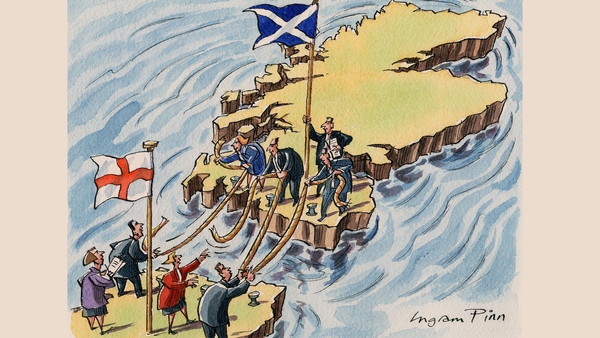Last updated:
February 17, 2014 7:13 pm
Scotland can be a model for how to handle separatism
There are remarkably few examples of nations breaking up in a civilised way

Some
years ago, I made a futile attempt to persuade a Chinese diplomat that
Taiwan should be allowed to declare independence – if that is what its
people want. “If Scotland voted to be a separate nation,” I argued,
“England would not stop it.” The diplomat smiled sceptically, like a man
recognising a particularly crude falsehood. “I know that’s not true,”
he said. “England would never accept Scottish independence. It would invade.”
I recalled that conversation in Edinburgh last
week as I watched preparations for Scotland’s referendum on independence
next September. George Osborne, the UK chancellor, had travelled to the
Scottish capital to give a speech warning that an independent Scotland
would not be allowed to keep the pound
as its currency. A few days later, José Manuel Barroso, president of
the European Commission, said that it would be “very difficult, if not
impossible” for an independent Scotland to join the EU. This is tough,
even brutal, politics – and it has provoked complaints of bullying from
pro-independence campaigners.
More
On this story
- Barroso warns Scots on EU membership
- Report warns on Scottish currency union
- Cameron tells Scots ‘We want you to stay’
- What happens next if Scotland votes Yes?
- Spain promises non-interference on Scotland
Gideon Rachman
Yet
take a couple of steps back – and place the Scottish referendum in a
historic and international context – and what is remarkable about it is
how consensual and peaceful it is. The Chinese are not alone in finding
it remarkable that the government of the UK is willing to allow the
country to break up without a fight. Elif Shafak, a Turkish novelist
living in London, told me that she had been pleasantly surprised by the
speech in which David Cameron, the British prime minister, appealed to
the Scots to vote against independence.
As she put it: “Coming from Turkey, where more than 35,000 people were
killed in Turkish-Kurdish conflict and the Turkish state is yet to
recognise the Kurds’ right to education in their mother tongue, I was
positively surprised to hear Cameron speak so peacefully about the
possibility of Scottish independence.”
The international reaction to the Scottish debate makes me think that
the prime minister got something wrong in his speech on February 7. Mr
Cameron argued: “If we lost Scotland ... we would pull the rug from our
reputation.” On the contrary, I think the UK government’s willingness to
allow the centuries-old union to be dissolved peacefully is a boost to
the country’s reputation. To adopt Mr Cameron’s marketing speak, the
British brand is built around tolerance, the rule of law and democracy.
There is no better demonstration of those values than the Scottish
referendum.There are remarkably few examples of nations breaking up in a civilised way. The most famous is the velvet divorce between the Czechs and the Slovaks in 1993. A better analogy to Scotland’s situation may be Norway’s referendum on independence from Sweden in 1905. After briefly contemplating war, the Swedes thought better of it and negotiated a divorce.
Given its brutal history, the break-up of the
Soviet Union in 1991 was surprisingly peaceful – but the Russians have
since fought a savage war to prevent the secession of Chechnya. Even in
democratic Europe, Spain is refusing to contemplate the idea of an independence referendum for Catalonia.
The US, of course, fought a civil war to save its union. If modern-day
Texas decided to secede from the US – as Rick Perry, its governor, once
hinted that it might – my guess is that Washington would once again
fight to keep the country together.
So why is the UK government behaving differently? Why has it decided
to imitate Canada, which allowed Quebec to hold a referendum on
independence, rather than China or the US which take a harder line with
Taiwan and Texas? Probably because the government in Westminster
recognises that the UK is a union of separate nations with historically
distinct identities: morally and practically it can only be kept
together on the basis of consent. Britain did put up a fight to prevent
Irish independence, almost a century ago, and that was clearly a
mistake. Ending the long-running Troubles in Northern Ireland also
involved making it explicit that the province’s destiny is ultimately up
to the people who live there.However, while Scottish independence would be achieved peacefully, there is no guarantee that the divorce would be amicable. The reaction to Mr Osborne’s speech ruling out a currency union gave a sense of how bad things could get. In response, the nationalists have said that if an independent Scotland is denied the use of the pound, it would refuse to take on a share of the UK’s debt.
Both sides insist the other side is bluffing. But what if they are not? If the Scots surprise the pollsters and vote for independence, the subsequent negotiations could swiftly become very messy and acrimonious. If Scotland really did refuse to take on a share of the UK debt, it is possible to imagine that parliament in Westminster would reject the terms of the divorce by refusing to repeal the Act of Union between Scotland and England of 1707. It would not be war but it would be an enormous constitutional crisis.
Under such circumstances, even the British might struggle to live up to their self-image of calmness, legality, indifference and fairness. Even so, I still think the assurances I gave to my Chinese diplomat friend hold true. Ultimately both Scotland and England would find a way to make a peaceful divorce work. That would be best for “the children” of the UK. But it would also offer a global lesson in the civilised way to handle separatism.
Twitter: @gideonrachman

No comments:
Post a Comment